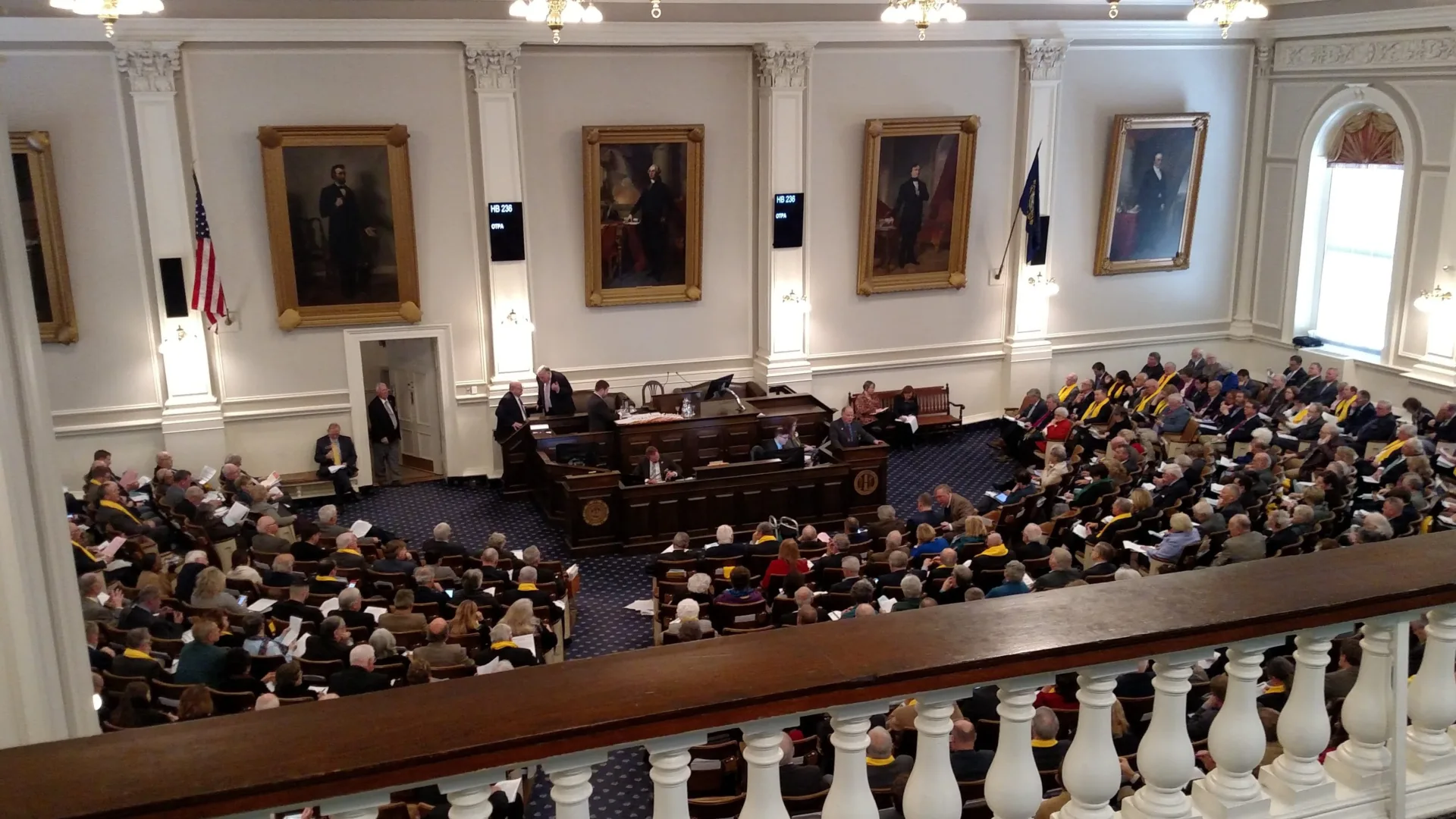A landmark legislative session was held in New Hampshire this year. It marked the first time a Community Rights state constitutional amendment was debated and voted on by a state House of Representatives. The proposed amendment was drafted with CELDF’s assistance, advanced by the New Hampshire Community Rights Network (NHCRN), and supported by communities across the state. It recognizes the authority of people in towns throughout the state to enact local rights-based laws protecting individual and communities’ rights, free from corporate interference and state preemption. That authority includes the right to protect the natural environment.
If adopted by voters, the NH Community Rights Amendment would become Article 40. Right of Local, Community Self-Government of the New Hampshire Bill of Rights. The amendment:
- Recognizes, secures, and protects the individual and political right of people in municipalities across New Hampshire to adopt local rights-based laws, free from ceiling preemption and corporate personhood.
- Recognizes that people, communities, and natural environments have rights to health, safety, and welfare, and the authority to prohibit corporate activities that violate those rights.
- Ensures that local rights-based laws can only be used to expand rights and protections for people, communities, and natural environments. Any efforts to restrict fundamental rights under the amendment would not be recognized.
Nine bi-partisan sponsors championed the NH Community Rights Amendment. It is the first Community Rights amendment in the nation to receive support from a legislative subcommittee with a recommendation of “ought-to-pass.”
The amendment did not receive the 3/5 super-majority vote required to advance a state constitutional amendment to the November ballot. However, this was not surprising given that the full committee chair ignored the subcommittee recommendation’s “ought-to-pass.” He allowed a motion of “inexpedient-to-legislate” to stand and move to the House floor.
Despite this, 1/3 of the New Hampshire House of Representatives demonstrated their support to elevate the right of New Hampshire people to pass local laws protecting health, safety, and welfare of individuals, their communities, and natural environments from corporate activities that harm them. These legislators recognize the inalienable right of people to protect themselves from corporations intent on using communities as sacrifice zones. Community Rights supporters are encouraged both by the bi-partisan support the people’s amendment received in the subcommittee, and the 112 votes in favor of advancing the amendment to voters.
A History of Local Community Self-Government
Historically, New England town meeting is where citizens legislate. Here, like nowhere else, people have participated directly in governing—in practice, not just in concept. Every citizen is a local legislator at town meeting. These are legislatures operated by ordinary people who choose not to leave their lawmaking to someone else. Town meeting style of governing in New Hampshire dates back to the early 1600s, when Europeans first settled. The world calls it democracy. New Englanders call it town meeting.
The right of this democratic self-governance is protected in the Bill of Rights. It constitutes Part First of the New Hampshire Constitution. The document is remarkable compared to most other modern state constitutions. It retains much of the fervor for self-governing rights that were fought for by our Revolutionary ancestors as well as the inspirational and powerful words of the Declaration of Independence.
It provides that:
“…all men [sic] have certain natural, essential and inherent rights…(Article 2.);…all government of right originates with the people [and] is founded in consent…(Article 1.); all power residing originally in, and being derived from, the people, all magistrates and officers of government are…at all times accountable to them (Article 8.); and government being instituted for the common benefit…and not for…private interest…, whenever the ends of government are perverted…the people may, and of right ought to reform the old, or establish a new government…(Article 10.); that every subject of this state is entitled to a certain remedy, by having recourse to the laws, for all injuries he [sic] may receive in his [sic] person, property or character, to obtain right and justice freely…(Article 14.)”
These constitutionally-recognized rights affirming the right of local community self-government were codified so that we, the people, would not be at the mercy of our state government, nor at the mercy of corporate and other interests intent on exploiting our communities.
Weakening Local Community Self Government
Today, efforts are underway in New Hampshire to weaken local control and democratic self-governance. We see the people’s struggle to keep their local self-governing authority. New Hampshire state government is reducing the number of issues that residents can directly legislate, denying community members their right to pass any local law that the state does not specifically authorize. This is called “preemption.”
Further, national politicians, aided and abetted by the media, have changed the very meaning of town meeting from a community legislature to a public meeting and a political campaign technique. Even municipalities are turning away from the traditional town meeting practice of community members participating in open dialogue and learning from neighbors, instead limiting it to simply approving or rejecting local legislation.
Entrenched Barriers to Local Community Self-Government
Corporate interests and their government allies use our legal and governing structures at the state and national levels to erect barriers to local control through preemption. Simultaneously they legalize violations of our right to self-govern. The state creates corporations in our name by issuing charters. Corporations are therefore creatures of the state and should be governable by the people. But a long train of abuses and usurpations, in which courts and legislatures have elevated corporate power, now strips us of our rights and renders hollow the powerful language of our current constitution.
These violations are real and constant. For example, communities regularly come together to stop harmful corporate activities. They are repeatedly slapped by the state for acting beyond their authority (preemption) or sued by corporations for infringing on corporate claimed “rights.”
The Remedy is Us
There is no remedy by elected representatives or the courts, as these are the very bodies that have given momentum to ever-growing corporate power. There is no one to take corrective action except we, the people. When the living generation finds that old ways and new wrongs deprive them of their inalienable rights and their ability to govern their own communities, let there be no hesitation. The people have the right and authority to change their constitution and style of government.
Our work is to drive constitutional change guaranteeing in specific, unassailable terms that it is the people who govern. It is the people who have the authority and right to enact and enforce laws in their own communities—including laws that prevent the state from empowering corporations to violate Community Rights under color of state law.
As the Declaration of Independence advises, it is both our right and our duty to throw off such government, and to provide new guards for our future security.
A Movement Whose Time Has Come
Communities in New Hampshire face a myriad of unsustainable projects, including industrial hydro transmission lines, fracked gas pipelines and infrastructure, corporate water withdrawals, ridgeline industrial wind projects, social discriminations, and voter suppression.
More than ten years ago, communities began declaring, “Enough!” They enacted local Community Rights laws to protect their air, water, and soil. In so doing, they launched the Community Rights movement in New Hampshire.
It began in Barnstead in 2006.
Barnstead Leads
Barnstead community members witnessed an expensive legal battle in the nearby towns of Nottingham and Barrington. Their neighbors were fighting to stop corporate extraction of their drinking water for sale overseas. Barnstead was threatened as well since their watershed is only a few miles from the aquifer targeted for extraction. A two-week draw test from testing wells in Nottingham and Barrington revealed contaminants were drawn in from over two miles away, having the potential to contaminate Barnstead’s watershed.
Barnstead, Nottingham, and Barrington residents were familiar with the New Hampshire Groundwater Protection Act. The Act refers to water as a local resource, and that towns should have the first opportunity to institute water protections.
However, the New Hampshire Department of Environmental Services (NHDES) sets the criteria for protecting water within the state, and they legalize “Large Groundwater Withdrawals” by issuing permits to business entities. Through state preemption, they deny towns local decision-making authority to reject those permits.
Thus, while in theory communities’ right to safeguard their water is protected in the Groundwater Protection Act, in reality it is not.
Barnstead changed that. At town meeting in 2006, with only one dissenting vote, community members overwhelmingly voted to adopt the Water Rights and Local Self-Government Ordinance. The ordinance codifies their right to “hold their water in public trust to access, use, consume and preserve water drawn from sustainable natural water cycles that provide water necessary to sustain life within the Town, including rights of natural communities and ecosystems.” It bans corporate water withdrawals as a violation of those rights.
Other Towns Join Them
Corporate water withdrawals are not the only threat to Granite State communities. New Hampshire is slated to become a corporate energy corridor. A high-voltage direct current transmission line, ridgeline industrial wind projects, and pressurized fracked gas distribution lines are all proposed to export energy out of state. These large-scale energy sources are known to contribute to health issues and contamination of water, air, and soil.
Just like the NHDES, the New Hampshire Site Evaluation Committee (NHSEC) was created by the state legislature in 1989 for “review, approval, monitoring and enforcement of compliance in the planning, siting, construction and operation of energy facilities.” The mission of the NHSEC does not mention protecting public health, safety, or welfare. It functions as designed: a rubber stamp agency for all energy facilities in New Hampshire. In fact, since its inception, only two projects have been denied. One of them was resubmitted and approved three years later, the other is currently in the process of appealing their denial.
Since Barnstead’s first Community Rights ordinance in 2006, nearly a dozen other New Hampshire communities have joined them. From Barrington to Hebron, and from Sugar Hill to Atkinson, New Hampshire residents are protecting their right to local community self-government – including the right to decide on corporate projects that threaten local economies, natural environments, and way of life.
Moving Beyond the Environment – Religion
A decade after the people of Barnstead inspired the Community Rights movement in New Hampshire, residents took an unprecedented step to unanimously reject the possibility of requiring people of a certain religion to carry religious identification cards. Local representatives wanted to protect Barnstead residents from political and civil persecution based on their religious beliefs. In 2016, during the presidential campaign, community members adopted the Right to be Free from Religious Identification Ordinance. The ordinance protects the right of community members to be free from religious discrimination on the basis of religious or other beliefs. It prohibits any local, state, or federal legal requirement that individuals identify themselves as members of a particular religious faith or group with a particular set of beliefs.
The ordinance is particularly important to the community because of the state’s shared border with Canada. U.S. Border Patrol agents, through the U.S. Customs and Border Protection agency, have certain extra-Constitutional powers within 100 miles of any U.S. “external boundary.” Thus, all of New Hampshire is subject to Border Patrol agents to operate immigration checkpoints.
Moving Beyond the Environment – Voting
Voting rights are also a concern for New Hampshire residents. With over fifty voter restriction bills proposed over the past two state legislative sessions, voting rights are under attack. The New Hampshire Attorney General’s (AG) office and Secretary of State (SOS) are united in their claim that voter fraud is virtually non-existent in the state. Yet, when residents attempt to verify accurate vote counts submitted via voting machines, the AG, SOS, and other state election officials hinder those efforts, obstructing discovery of possible computer errors—whether intentional or not.
For example, community members turned to their town moderators to verify vote counts. Town moderators are locally elected officials. They take an oath pursuant to the New Hampshire Constitution and are bound to govern the election process, openly oversee the counting of votes on election night, and make a public declaration of an accurate vote count.
Town moderators recently had their constitutional authority challenged by state election officials. When those officials were given the opportunity to empower town moderators to carry out their constitutional duty to verify the accuracy of vote-counting machines, the officials refused. They would rather assume vote-counting machines are accurate than to have evidence of their accuracy.
With almost 90% of Granite State municipalities using vote-counting machines programmed with secret proprietary software, it is clear to many residents that verification is essential.
Growing Agitation
Granite State residents have deep roots in local and democratic community self-government, with a strong independent streak. The steady erosion of this right by state and corporate interests is driving more and more people and communities to the Community Rights movement.
Groundbreaking Legislation
The New Hampshire Community Rights state constitutional amendment is groundbreaking legislation that directly protects the authority of community members and local governments to make local governing decisions. This includes banning unsustainable development projects, establishing voter protections, and codifying stronger social, economic, and environmental protections than in place at the state and federal level.
A peaceful remedy for the injustices inflicted on our communities is possible with the state legislature. They have the power and duty to approve the proposed language of the NH Community Rights Amendment and allow residents to decide whether to adopt it as part of their constitution.
We know from prior people’s movements that fundamental change takes persistent, unrelenting pressure. As corporate threats grow in the Granite State, more communities are joining the Community Rights movement. The NH Community Rights Amendment will be reintroduced in the future because our quality of life, indeed our very lives and those of our children and future generations, depend on it.
Featured Special Report Image on Home Page: Image_1190 by Stephen Dettling, Flickr Creative Commons.



